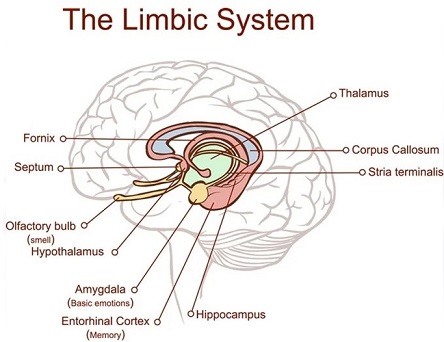COVID-19 News: Scientists Warn That SARS-CoV-2 Infections Can Lead To Damages Of The Limbic System!
Nikhil Prasad Fact checked by:Thailand Medical News Team Dec 11, 2023 1 year, 4 months, 6 days, 22 hours, 10 minutes ago
COVID-19 News: In an alarming revelation, scientists from the Faculty of Medicine at TOBB University of Economics and Technology in Ankara, Turkey, have issued a dire warning about the insidious, long-term effects of SARS-CoV-2 on the human brain. Despite the World Health Organization's stupid declaration of the end of the COVID-19 pandemic on May 5, 2023, a silent and potentially devastating threat continues to loom on the horizon.
 The Limbic System
The Limbic System
The focus of this alarming discovery covered in this
COVID-19 News report, is on the limbic system, an intricate network of brain structures responsible for emotions, memories, and arousal. Recent research, published in the esteemed journal Brain Communications in June 2023 by Thomasson et al., has uncovered a hidden danger - SARS-CoV-2 infections causing severe damage to the limbic system.
https://academic.oup.com/braincomms/article/5/4/fcad177/7194779?login=false
The implications of this damage go beyond immediate neurological symptoms, extending to profound and potentially irreversible consequences for COVID-19 survivors.
It should also be noted that damage to the limbic system can also result in the emergence of a variety of mental health issues!
To comprehend the gravity of this finding, let's delve into the limbic system itself. Originally coined as the "grand lobe limbique" by Paul Broca in 1878 and later referred to as the limbic lobe by Paul D. MacLean in 1949, the limbic system is a collection of brain structures situated lateral to the thalamus, underneath the cerebral cortex, and above the brainstem. Though its individual components have undergone redefinition multiple times, the limbic system is broadly understood to include the amygdala, hippocampus, parahippocampal gyrus, fornix, columns of the fornix, mammillary body, septum pellucidum, cingulate gyrus, and entorhinal cortex.
This region, with its origins in the mesencephalic, diencephalic, and telencephalic components of the brain, plays a pivotal role in regulating emotions, memories, and arousal. While initially believed to be the sole neurological system involved in emotion regulation, advances in neuroscience have revealed that the limbic system contributes to various processes related to cognition, including spatial memory, learning, motivation, emotional processing, and social processing.
Now, Thomasson et al.'s groundbreaking study has shed light on a previously underestimated aspect of SARS-CoV-2's impact - limbic system damage. The researchers delicately demonstrated that COVID-19 patients, especially those severely affected, displayed impaired emotion recognition, coupled with decreased memory and olfactory abilities. Astonishingly, these effects lingered six to nine months after the initial infection. Th
e study also identified altered functional connectivity patterns involving cortico-subcortical-cerebellar networks, unveiling the intricate web of damage caused by the virus.
The limbic system's association with COVID-19 became apparent early in the pandemic when the loss of olfaction emerged as a major symptom. Subsequent studies explored altered metabolism, perfusion, structure, and connectivity in the limbic structures post-COVID-19.
Thomasson et al.'s research now adds a crucial layer to this understanding, revealing not only the behavioral consequences of limbic system damage but also the associated functional connectivity changes that persist in the long term.
However, as with any groundbreaking research, Thomasson et al.'s study has its limitations, notably the absence of a control group and the focus on specific limbic structures such as the amygdala.
Given reports of the insula, hippocampus, parahippocampus, perirhinal, and entorhinal cortices being affected in long COVID, a more comprehensive examination of these structures, in comparison with an age and sex-matched control group, could yield invaluable insights into neurodegenerative diseases anticipated after the pandemic.
In conclusion, the impact of SARS-CoV-2 on the human brain goes beyond acute complications and long COVID. The limbic system, once thought to regulate only emotions, emerges as a critical player in regulating cognition and overall mental well-being. As we grapple with the aftermath of the pandemic, the urgent call is for continued and intensified research into the neural damage caused by SARS-CoV-2. The silent threat to the limbic system must be addressed to safeguard the mental well-being of COVID-19 survivors and prevent potential long-term neurodegenerative consequences. The world watches as scientists strive to unravel the mysteries of the virus, urging global collaboration to protect the human brain from this insidious invader.
The Turkish researchers’ warnings were published as a letter to the peer reviewed journal: Brain Communications.
https://academic.oup.com/braincomms/advance-article/doi/10.1093/braincomms/fcad340/7462156
For the latest
COVID-19 News, keep on logging to Thailand Medical News.
